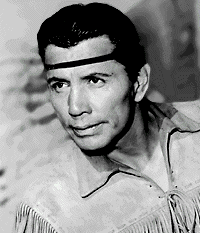 Another response to Tonto and the "Good Indian":
Another response to Tonto and the "Good Indian": Another response to Tonto and the "Good Indian":
Another response to Tonto and the "Good Indian":
>> You are quite right about the typical Hollywood portrayal of Indians. But let no one ever mistake Hollywood's products for truth or art on any subject, let alone Indians. Movies and TV are mostly lowest common denominator "entertainment" and really ought to be beneath criticism other than to observe that dreck is dreck. <<
Where do you think people learn about Indians if not from the media, including entertainment? Do you think they're sitting at home reading Bury My Heart at Wounded Knee?
I have a page documenting the harm of stereotypes. I have a huge collection of stereotypes that people have bought into from reading old textbooks, seeing old Westerns, or whatever their source of information is. Whatever you think that source is, it isn't reality. That constant misinformation, which manifests itself as stereotyping, is a problem.
>> Once in awhile, though, someone cares enough to at least try and get it rightóthough the truth is, none of us really know "the way hit was". <<
Many early visitors to the Americas recorded their impressions of the Indians. We know a lot more than you could tell from seeing mascots dance around or watching the recent Indian-bashing episode of "South Park."
>> Speaking of which, it is no more historically correct to have Indians portrayed as cardboard good guys <<
I never said it was. I have a page critiquing the "noble savage." If someone stereotypes Indians as too pure and noble (rare, but it happens), I'll include it in my Stereotype of the Month contest.
>> though I suppose it is more satisfying to a culture to be portrayed as the "noble savage" than the "savage". <<
Right. A positive stereotype is better than a negative stereotype, but it's still wrong. Most Native people would say they want to see the good and the bad in their lives, not just the good. Some Apaches made that point explicitly after viewing The Missing.
>> I left the theater disgusted at this mostly one-sided epic which reduced all the complex questions of cultural clash to another good-guy/bad-guy morality play. It provided little satisfaction that the sides had been switched. <<
I liked Dances with Wolves, since it was much better than many portray attempts to portray Indians. But I would've critiqued it if I'd been doing the contest at the time.
>> And sin of all sins, the hero still had to be a white guy. <<
Yes. That's a point I make and criticize often.
Words invite stereotyping and bigotry?!
>> The truth is the terms themselves invite stereotyping and bigotry. <<
Not really. We categorize everything and use collective nouns for a reasonóbecause we don't have time to specify every detail. We say "dogs bark" because we don't have time to survey all 60 million or whatever dogs and list exactly which ones bark and which don't. As a rule, the statement is true, even though it may be false for particular dogs.
>> The truth is group-think inevitably leads to "us and them". <<
Not really. Perhaps if that's the only way someone thinks, it might. Fortunately, it's quite possible to recognize groups and individuals at the same time. "Dogs bark" but "my Fido doesn't bark."
"Group-think" is a term conservatives have misused to denigrate people who stand up for their rights. The truth is that people don't think of themselves as members of a group and not as individuals. They think of themselves as both because they are both.
Since you (mis)used the term, I guess that makes you a conservative.
The real truth is that ignorance, not "group-think," leads to stereotyping and bigotry. That was true 2,000 years ago and it'll be true 2,000 years from now, when the term "group-think" is long forgotten.
>> Maybe we need to try to look at individuals as individuals. <<
Are you sure that isn't incredibly trite? Who do you think is not doing that? Indians, or the people who stereotype Indians?

I'd say it's mostly the latter. Let's take an example in the news: Arnold Schwarzenegger. He said Indians are a "special interest" who need to pay their "fair share." He made no effort to distinguish between Indiansónot even to acknowledge that half the state's tribes don't have gaming. Hence he stereotyped them all as too greedy and powerful.
In contrast, I know lots of individual Indians involved in gaming. A couple may have let the money and power go to their heads. Most are genuinely concerned about helping their people, not aggrandizing themselves.
And yet, I have no problem referring to Indians collectively when it facilitates the dialog. If necessary, I can break it down and say these Indians seem greedy while those Indians seem concerned about their people. Knowledge is what makes that possible. I have it and Schwarzenegger doesn't.
So he and people like him are the problem. And our criticizing and educating people like him is the solution.
Are generals born or created?
>> Crazy Horse and Sherman were great generals, which says a lot more about either of them than that one was Indian and one was white. <<
Not necessarily. Their abilities and tactics arose out of their upbringing and environment. Had they switched places at birth, they might be totally different people. They might still be great generals, but they might've adopted each other's tactics.
So they're both individuals with unique traits, but their beliefs were shaped by their background and heritage. Which includes their group affiliations and their ethnicity. I don't have a problem seeing them as individuals and as members of various groups. Do you?
You and every person you know is a member of many groups. For starters, you belong to a nation, state, city, and neighborhood. Also, you belong to self-organized groups for professional, religious, academic, and recreational purposes. You and every person you know identifies himself as members of these groups.
Ethnicity is just another of the many groups people belong to. Identifying oneself as an Indian doesn't cause any more harm than identifying oneself as a lawyer, a Republican, an Episcopalian, a Harvard graduate, or a Rotarian. It doesn't cause any more harm than identifying a dog as an animal, a rose as a plant, or gold as a mineral.
One can stereotype any of these groups, but one can also identify common traits. These groupings exist for a reason. They don't just happen at random.
The fact of someone's group membership is just that: a fact. If you find it hard to accept that a lawyer is a lawyer or a Republican is a Republican, well, wishing won't make it untrue. It's called reality, so you'll just have to deal with it.
>> And as for Tonto, maybe we ought to remember he is a ficitional character. <<
I remember it. So are God and Jesus, arguably. Yet look how utterly they've influenced the world.
>> Maybe he is simply the strong and silent type who doesn't say much, but can always be counted on when trouble comes. It could have been a whole lot worse; the writer could have made Tonto another Gabby Hayes. <<
Yes, well, mediocre is mediocre, not great. I think I said as much in my review of Tonto. He could've been worse, but he could've been better.
>> Come to think of it, Gabby Hayes with his irreverent humor is a whole lot closer than Tonto to most Indians I know. <<
Which is why the whole "stoic Indian" stereotype is problematical.
>> Besides, if we don't like the way ficitional characters are portrayed, we can always create our own fictional characters. <<
I'm doing that in my comics while critiquing unsatisfactory works. Again, we don't have to choose. We can do one or the other or both.
Rob Schmidt
Publisher
PEACE PARTY
http://www.bluecorncomics.com
Related links
Outside the so-called ethnic box
TV shows featuring Indians
The best Indian movies
|
. . . |

|
All material © copyright its original owners, except where noted.
Original text and pictures © copyright 2007 by Robert Schmidt.
Copyrighted material is posted under the Fair Use provision of the Copyright Act,
which allows copying for nonprofit educational uses including criticism and commentary.
Comments sent to the publisher become the property of Blue Corn Comics
and may be used in other postings without permission.